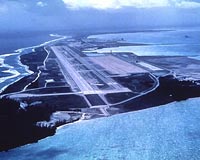| . |  |
. |
Beijing, China (SPX) Dec 09, 2009 The collision between the Siberian Plate and North China Plate was a significant geological event in earth history, which led to the final closure of the Paleoasian Ocean and the formation of the Eurasian continent. Despite numerous research efforts in recent decades, the precise time of this event has remained a puzzle until now. New evidence in helping settle this issue is provided by Prof. Deng Shenghui and his colleagues in their paper newly published in Science in China (2009, vol.52). Geological studies have demonstrated that during the early Paleozoic, an interval from 450-300 million year ago, the Siberian paleo-land was thousands kilometers away from the North China paleo-land, which is very different from their present situation. An immense ocean of thousands kilometers wide, namely the Paleoasian Ocean, separated these two paleo-lands. During the Carboniferous and Early Permian (about 360-270 million year ago), the North China paleo-land was located near the equator, where subtropic-tropic type of flora grew, named as "the Cathaysia Flora". In contrast, the Siberian paleo-land was located at high latitude, where temperate flora was distributed, known as "the Angara Flora". These two types of floras are very distinctive and do not mix with each other because of the geological barrier and their separate niches in different climatic zones. Prof. Deng and his collaborators concluded that the time of the Paleoasian Ocean's disappearance is the end of the Permian, about 251 million years ago, based on their study of land plant fossils. Several years ago, Deng and his research group found many plant fossils from the rocks that were formed in the Late Permian during their stratigraphical and paleontological investigation in Heilongjiang, Northeast China. These fossils could be divided into two types after detailed identifications. One belongs to Angara Flora and the other to Cathaysia Flora. So, these plant fossils represent a mixed flora. The mixed flora implies that the Angara type plants lived together with some Cathaysia type plants at this location in the Late Permian. This means that the Paleoasian Ocean, once a barrier of plant immigration, must have disappeared in the Late Permian, and those plants grew previously in North China paleo-land now immigrated to the Siberian paleo-land. Therefore, Deng and his colleagues suggested that the Paleoasian Ocean finally closed at the end of the Late Permian, about 251 million years ago. Prof. Deng is a paleontologist in the Research Institute of Petroleum Exploration and Development, PetroChina, which is the largest national oil corporation in China. In order to explore more oil and gas resources, many basic geological problems should be solved first, such as the forming age of the oil and gas-bearing rocks, the paleogeography, paleoclimate, and paleoecology etc. Fossils, fossilized bodies and traces of ancient animals and plants, play an extremely important role in study of these basic geological problems. Prof. Deng and his paleontological group focus on the researches of various fossils.
Share This Article With Planet Earth
Related Links Science in China Press PetroChina Water News - Science, Technology and Politics
 Mauritius urges UK to freeze Chagos marine park project
Mauritius urges UK to freeze Chagos marine park projectPort-Louis (AFP) Dec 5, 2009 Mauritius has officially asked London to freeze a project to turn the Chagos archipelago, also known as the British Indian Ocean Territory, into a marine reserve, the premier said Saturday. Mauritian Prime Minister Navin Chandra Ramgoolam told reporters here upon his return from the Commonwealth summit in Trinidad and Tobago that he voiced his reservations unequivocally. Between 1967 and ... read more |
|
| The content herein, unless otherwise known to be public domain, are Copyright 1995-2009 - SpaceDaily. AFP and UPI Wire Stories are copyright Agence France-Presse and United Press International. ESA Portal Reports are copyright European Space Agency. All NASA sourced material is public domain. Additional copyrights may apply in whole or part to other bona fide parties. Advertising does not imply endorsement,agreement or approval of any opinions, statements or information provided by SpaceDaily on any Web page published or hosted by SpaceDaily. Privacy Statement |